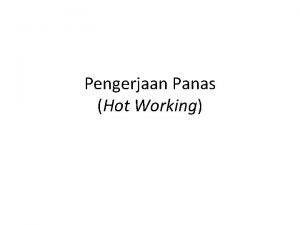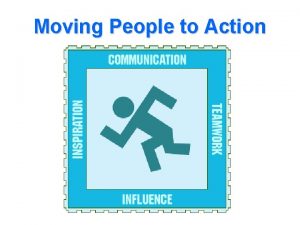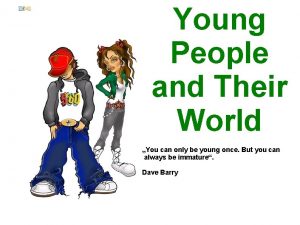Working With Movies Moving People and Their Ideas

















- Slides: 17

"Working With Movies. Moving People and Their Ideas" GENDER INEQUALITY ITALY (8 April-15 April 2018)

What is gender inequality? Gender inequality is the idea and situation that women and men are not equal. Gender inequality refers to unequal treatment or perceptions of individuals wholly or partly due to their gender. It arises from differences in gender roles. Gender systems are often dichotomous and hierarchical. Gender inequality stems from distinctions, whether empirically grounded or socially constructed. Women lag behind men in many domains, including education, labor market opportunities and political representation.

10 Examples of Gender Inequality in the World 1. Lack of Mobility 2. Freedom of Marriage 3. Discriminatory Divorce Rights 4. Citizenship 5. Frontline Combat 6. Custody Rights 7. Violence 8. Professional Obstacles 9. Restricted Land Ownership 10. Access to Education

IN TURKEY Child Brides Although illegal, child marriage in Turkey remains prevalent, especially among less educated families. It is a controversial political issue, and a topic of contention between liberal and conservative segments of society. Child marriages take place in every region of Turkey. However, the provinces where the proportions are the greatest are concentrated in Eastern and Central Anatolia. Nowadays these rates are decreasing and it almost becomes to be disappear.

Education According to a 2013 Gaziantep University research, 82% of child brides in Turkey are illiterate. Official reports indicated that 675 girls who were enrolled in primary schools had dropped out during the course of the year in 2009 due to marriage or getting engaged, as opposed to 18 boys.


Gender roles in parenting and marriage? Gender roles are heavily influenced by biology, with male-female play styles correlating with sex hormones, sexual orientation, aggressive traits and pain. Furthermore, females with congenital adrenal hyperplasia demonstrate increased masculinity and it has been shown that rhesus macaque children exhibit preferences for stereotypically male and female toys.


Property Inheritance Many countries have laws that give less inheritance of ancestral property for women compared to men.

Structural marginalization Gender inequalities often stem from social structures that have institutionalized conceptions of gender differences. Marginalization occurs on an individual level when someone feels as if they are on the fringes or margins of their respective society. This is a social process and displays how current policies in place can affect people. For example, media advertisements display young girls with easy bake ovens (promoting being a housewife) as well as with dolls that they can feed and change the diaper of (promoting being a mother).

Gender stereotypes Cultural stereotypes, which can dictate specific roles, are engrained in both men and women and these stereotypes are a possible explanation for gender inequality and the resulting gendered wage disparity. Women have traditionally been viewed as being caring and nurturing and are designated to occupations which require such skills. While these skills are culturally valued, they were typically associated with domesticity, so occupations requiring these same skills are not economically valued. Men have traditionally been viewed as the main worker in the home, so jobs held by men have been historically economically valued and occupations predominated by men continue to be economically valued and earn higher wages.

Variations by country or culture

Europe holds the top four spots for gender equality, with Iceland, Finland, Norway and Sweden ranking 1 st through 4 th respectively, it also contains two nations ranked in the bottom 30 countries, Albania at 108 and Turkey at 120. The Nordic Countries, for several years, have been at the forefront of bridging the gap in gender inequality. Every Nordic country, aside from Denmark who is at 0. 778, has reached above a 0. 800 score. In contrast to the Nordic nations, the countries of Albania and Turkey continue to struggle with gender inequality.

Western Europe Western Europe, a region most often described as comprising the non-communist members of post-WWII Europe, has, for the most part been doing well in eliminating the gender gap. Western Europe holds 12 of the top 20 spots on the Global Gender Gap Report for overall score.

Eastern Europe Resides between 40 th and 100 th place in the Global Gender Gap Report. A few outlier countries include Lithuani which jumped nine places (37 th to 28 th) from 2011 to 2013, Latvia, which has held the 12 th spot for two consecutive years, Albania and Turkey.

5 Ways To Help Stop Gender Inequality! 1. Stand up for your rights! 2. Raise awareness. 3. Sponsor a child. 4. Involvement in politics. 5. Be an activist.

THANKS FOR YOUR ATTENTION ITALY 2018 / 8 April-15 April
 Movies about moving to europe
Movies about moving to europe Hot working and cold working difference
Hot working and cold working difference Principle of hot working process
Principle of hot working process Machining operations
Machining operations Pembentukan plat pada pengerjaan panas
Pembentukan plat pada pengerjaan panas Smart work and hard work
Smart work and hard work Materials and their working properties
Materials and their working properties Moving people to action
Moving people to action Examples of people media
Examples of people media People and ideas on the move
People and ideas on the move Determines who wins most games candy bar
Determines who wins most games candy bar Ideas have consequences bad ideas have victims
Ideas have consequences bad ideas have victims Que son las ideas complementarias
Que son las ideas complementarias The young and their world
The young and their world What economics is
What economics is Where is the love 2016 lyrics
Where is the love 2016 lyrics Mood and tone movie
Mood and tone movie Why we crave horror movies answers
Why we crave horror movies answers
































